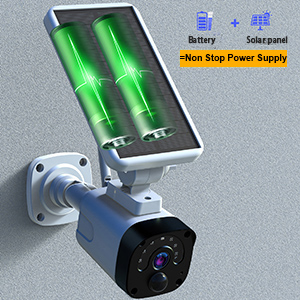Thinking about boosting your home security with solar-powered security cameras? It’s a smart move, environmentally friendly and potentially cost-saving – but are they truly worth the investment? This in-depth guide will help you weigh the pros and cons, explore the different options available, and ultimately decide if solar security cameras are the right choice for your needs.
The Allure of Solar Security: Environmental Friendliness and Cost Savings

Let’s face it: The appeal of solar-powered security cameras is undeniable. They offer a compelling blend of eco-conscious technology and potential long-term savings. By harnessing the sun’s energy, they reduce your carbon footprint and eliminate the need for constant battery replacements or running power cables. This translates to less waste and lower ongoing expenses. However, the reality is a little more nuanced than a simple “eco-friendly and cheap” label. We’ll delve into the specifics to help you make an informed decision.
Factors to Consider Before Investing in Solar Security Cameras

Before you rush out and buy a solar security camera system, it’s crucial to evaluate several key factors. These factors will heavily influence whether or not the investment is worthwhile for *your* specific situation:
1. Sunlight Availability
This is perhaps the most critical factor. Solar cameras rely on sunlight to charge. If your chosen location receives minimal sunlight throughout the day (due to shade from trees, buildings, or even long winters), the camera’s battery may not receive enough charge to operate effectively. Consider the amount of direct sunlight your property receives throughout the year. Poor sunlight will lead to inconsistent performance and potentially frequent battery drain.
2. Camera Features and Quality
Solar-powered security cameras vary significantly in terms of features and image quality. Some offer high-resolution video, night vision, motion detection, and two-way audio, while others offer a more basic package. Higher-quality cameras generally come with a higher price tag. Consider what features are essential for your security needs and budget accordingly.
3. Battery Capacity and Charging Speed
The battery capacity directly affects the camera’s operational time without sunlight. A larger battery will provide longer runtime during periods of low sunlight. Similarly, a faster charging speed is vital for maintaining consistent performance, especially in locations with unpredictable sunlight. Check the manufacturer’s specifications for details on battery capacity and charging time.
4. Installation Complexity
While generally easier to install than wired cameras, solar security cameras still require careful placement for optimal sunlight exposure. You’ll need to consider mounting options, cable management (for connecting to a network or power source during low-light periods), and potential weatherproofing issues.
5. Initial Cost vs. Long-Term Savings
Solar security cameras typically have a higher upfront cost compared to battery-powered or wired alternatives. However, the long-term savings on battery replacements and electricity costs can make them a worthwhile investment over time. Carefully calculate the total cost of ownership, including installation and potential maintenance, to determine if it aligns with your budget.
Comparing Solar Security Cameras to Traditional Options

Let’s compare solar security cameras to traditional wired and battery-powered alternatives:
| Feature | Solar Powered | Wired | Battery Powered |
|—————–|———————-|———————–|———————-|
| Installation | Moderate | Complex | Easy |
| Power Source | Solar & Battery | Mains Electricity | Battery |
| Running Costs | Low (Battery Replacements) | Moderate (Electricity) | Moderate (Battery Replacements) |
| Environmental Impact | Low | Moderate | Moderate |
| Reliability | Dependent on Sunlight | High | Dependent on Battery Life |
Choosing the Right Solar Security Camera: A Buyer’s Guide
The market offers a wide variety of solar-powered security cameras. To make an informed choice, prioritize these aspects:
* **Resolution:** Opt for at least 1080p (Full HD) for clear image quality.
* **Night vision:** Infrared (IR) night vision is essential for effective surveillance in low-light conditions.
* **Motion detection:** This feature triggers recording only when motion is detected, conserving battery power and storage.
* **Storage:** Consider cloud storage or local storage options for recorded footage.
* **Two-way audio:** This allows you to communicate with whoever is near the camera.
* **Weatherproofing:** Ensure the camera is rated for outdoor use and can withstand harsh weather conditions.
* **Warranty:** A good warranty provides peace of mind and protection against defects.
Is the Investment Worth It? The Verdict

The answer to whether solar security cameras are worth the investment depends on your individual circumstances. If you have a location with ample sunlight, a need for reliable security, and a budget that accommodates the higher upfront cost, then solar security cameras offer a compelling blend of eco-friendliness, cost savings, and cutting-edge technology. However, if your property has limited sunlight, or if budget is a major concern, then traditional battery-powered or wired alternatives might be more suitable. Carefully consider the factors discussed above before making your final decision. Don’t hesitate to read reviews and compare different models to find the perfect fit for your security needs.